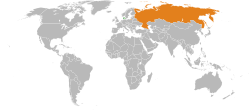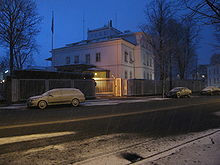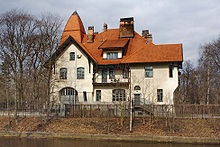- Denmark–Russia relations
-
Denmark–Russia relations 

Denmark
RussiaDenmark–Russia relations is the relationship between the two countries, Denmark and Russia. Diplomatic relations between Denmark and the USSR were established on June 18, 1924. Russia has an embassy in Copenhagen and a consulate in Tórshavn, and Denmark has an embassy in Moscow, a Consulate-General in Saint Petersburg, and an honorary consulate in Kaliningrad. Both countries border the Baltic Sea and are members of the Council of Europe and the Organization for Security and Co-operation in Europe.
Contents
History
Denmark, Russia, and Sweden have been allies in the League of Armed Neutrality against the British Royal Navy's wartime policy of unlimited search of neutral shipping for French contraband. Today, both countries are close trading partners, and trade mainly along the Baltic coast. A Russian Orthodox Church exists in the town of Copenhagen. The Church was a donation from Maria Feodorovna to the Orthodox community in Denmark at the end of the ninth century. A major event in bilateral relations was the transfer of the ashes of Empress Maria Feodorovna from Denmark to St. Petersburg in late September 2006 - 140-year anniversary of the arrival of Maria Feodorovna to Russia. The Faroe Islands was the only Danish overseas territory that decided to negotiate a free trade agreement with Russia.[1] The trade will go through Denmark, and then to Russia. There are also some Russian fishermen visiting Tórshavn, the capital of the islands. On May 27, Russia and Denmark signed visa agreements. Per Stig Moller, the current Foreign Minister of Denmark, stated that the agreements will help to ease contacts between scientists, businessmen and students of the two countries. The deal was also an inline agreement between Russia and the European Union.
Early Modern era
Amicable relations between the Kingdom of Denmark and the Muscovite state were based on a mutual assistance pact of 1493, renewed in 1506 and 1517.[2] In 1562, the Danish king Frederick II and the Russian tsar Ivan IV continued amicable relations based on the Treaty of Mozhaysk.[3]
Great Northern War
Main article: Great Northern WarDuring the Great Northern War, a coalition of numerous states successfully contested Swedish supremacy in northern Central and Eastern Europe. Initially, the anti-Swedish alliance was composed of Russia, Denmark-Norway Saxe-Poland-Lithuania. Frederik IV and August the Strong were forced out of the alliance in 1700 and 1706, respectively, but re-joined it in 1709. George I of Brunswick-Lüneburg (Hanover) joined the coalition in 1714 for Hanover, and 1717 for Britain, and Frederick William I of Brandenburg-Prussia in 1715. On the Swedish side were Holstein-Gottorp, between 1704 and 1710 several Polish and Lithuanian magnates under Stanisław Leszczyński and between 1708 and 1710 cossacks under Ivan Mazepa. The Ottoman Empire temporarily hosted Charles XII of Sweden and intervened against Peter the Great.
The war started with a threefold attack on Holstein-Gottorp, Swedish Livonia and Swedish Ingria by Denmark-Norway, Saxe-Poland-Lithuania and Russia, respectively. Sweden parried the Danish and Russian attacks at Travendal and Narva, and in a counter-offensive pushed August the Strong's forces through Lithuania and Poland to Saxony, dethroning August on the way and forcing him to acknowledge defeat in Altranstädt. Peter the Great had meanwhile recovered and gained ground in Sweden's Baltic provinces, where he cemented Russia's access to the Baltic Sea by founding Saint Petersburg. Charles XII moved from Saxony into Russia to confront Peter, but the campaign ended with the destruction of the main Swedish army in Poltava and Charles XII's exile in Ottoman Bender. Russian pursuit was halted at the Pruth by the Ottoman army.
After Poltava, the initial anti-Swedish coalition was re-established and subsequently joined by Hanover and Prussia. The remaining Swedish forces south and east of the Baltic Sea were evicted from the Swedish dominions, which the allies partitioned among themselves. Sweden proper was invaded by Denmark-Norway from the West and by Russia from the East. Though the Danish attacks were repulsed, Russia managed to occupy Finland and inflict severe losses on the Swedish navy and coastal fortresses. Charles XII opened up a Norwegian front, but was killed in Fredriksten in 1718.
The war ended with a defeat for Sweden, leaving Russia as the new major power in the Baltic Sea and a new important player in European politics — in fact, it signed the beginning of a pattern of Russian expansion that would only be stopped two centuries later.
Russo-Swedish War (1788–1790)
Main article: Russo-Swedish War (1788–1790)The Swedish attack on Russia caused Denmark-Norway to declare war on Sweden in accordance with its treaty obligations to Russia. A Norwegian army briefly invaded Sweden and won the Battle of Kvistrum Bridge, before peace was signed on July 9, 1789 following the diplomatic intervention of Great Britain and Prussia. Under their pressure, Denmark-Norway declared itself neutral to the conflict, bringing this Lingonberry War to an end.
See also
- Foreign relations of Denmark
- Foreign relations of Russia
- Embassy of Russia in Copenhagen
- Embassy of Denmark in Moscow
- Consulate-General of Denmark in Saint Petersburg
- Russian ambassadors to Denmark
References
- ^ Faroe Islands negotiate free trade agreement with Russia
- ^ Hübner, Eckhard (1998). "Zwischen alle Fronten: Magnus von Holstein als König von Livland". In Hübner, Eckhard; Klug, Ekkehard; Kusber, Jan (in German). Zwischen Christianisierung und Europäisierung. Beiträge zur Geschichte Osteuropas in Mittelalter und früher Neuzeit. Festschrift für Peter Nitsche zum 65. Geburtstag. Quellen und Studien zur Geschichte des östlichen Europa. 51. Stuttgart: Steiner. p. 317. ISBN 3515072667.
- ^ Hübner, Eckhard (1998). "Zwischen alle Fronten: Magnus von Holstein als König von Livland". In Hübner, Eckhard; Klug, Ekkehard; Kusber, Jan (in German). Zwischen Christianisierung und Europäisierung. Beiträge zur Geschichte Osteuropas in Mittelalter und früher Neuzeit. Festschrift für Peter Nitsche zum 65. Geburtstag. Quellen und Studien zur Geschichte des östlichen Europa. 51. Stuttgart: Steiner. pp. 317–318. ISBN 3515072667.
External links
- Danish embassy in Moscow
- Russian embassy in Copenhagen
- Russia, Denmark sign visa facilitation, readmission agreements
 Foreign relations of Russia
Foreign relations of RussiaAfrica Algeria • Angola • Benin • Botswana • Burkina Faso • Burundi • Cameroon • Cape Verde • Central African Republic • Chad • Comoros • Congo, Democratic Republic of the • Congo, Republic of the • Côte d'Ivoire • Djibouti • Egypt • Equatorial Guinea • Eritrea • Ethiopia • Gabon • Gambia • Ghana • Guinea • Guinea-Bissau • Kenya • Lesotho • Liberia • Libya • Madagascar • Malawi • Mali • Mauritania • Mauritius • Morocco • Mozambique • Namibia • Niger • Nigeria • Rwanda • São Tomé and Príncipe • Senegal • Seychelles • Sierra Leone • Somalia • South Africa • South Sudan • Sudan • Swaziland • Tanzania • Togo • Tunisia • Uganda • Zambia • Zimbabwe
Asia Abkhazia • Afghanistan • Armenia • Azerbaijan • Bahrain • Bangladesh • Bhutan • Brunei • Burma • Cambodia • China, People's Republic of • China, Republic of • East Timor • Georgia • India • Indonesia • Iran • Iraq • Israel • Japan • Jordan • Kazakhstan • Korea, North • Korea, South • Kuwait • Kyrgyzstan • Laos • Lebanon • Malaysia • Maldives • Mongolia • Nepal • Oman • Pakistan • Palestine • Philippines • Qatar • Saudi Arabia • Singapore • South Ossetia • Sri Lanka • Syria • Tajikistan • Thailand • Turkey • Turkmenistan • United Arab Emirates • Uzbekistan • Vietnam • YemenEurope Albania • Andorra • Austria • Belarus • Belgium • Bosnia and Herzegovina • Bulgaria • Croatia • Cyprus • Czech Republic • Denmark • Estonia • Finland • France • Germany • Greece • Hungary • Iceland • Ireland • Italy • Latvia • Lithuania • Luxembourg • Macedonia • Malta • Moldova • Monaco • Montenegro • Netherlands • Norway • Poland • Portugal • Romania • San Marino • Serbia • Slovakia • Slovenia • Spain • Sweden • Switzerland • Turkey • Ukraine • United Kingdom • Vatican CityNorth America Antigua and Barbuda • Bahamas • Barbados • Belize • Canada • Costa Rica • Cuba • Dominica • Dominican Republic • El Salvador • Grenada • Guatemala • Haiti • Honduras • Jamaica • Mexico • Nicaragua • Panama • Saint Kitts and Nevis • Saint Lucia • Saint Vincent and the Grenadines • Trinidad and Tobago • United StatesOceania South America Multilateral Arab League • BRICS • European Union • NATODiplomacy  Foreign relations of Denmark
Foreign relations of DenmarkAfrica 
Americas Asia Afghanistan · Bangladesh · Bhutan · Burma · Cambodia · China (PRC) · India · Indonesia · Iran · Iraq · Israel · Japan · Kazakhstan · Malaysia · Nepal · North Korea · Pakistan · Palestine · Philippines · South Korea · Sri Lanka · Syria · Taiwan · Thailand · United Arab Emirates · VietnamEurope Austria · Albania · Armenia · Azerbaijan · Belarus · Belgium · Bosnia and Herzegovina · Bulgaria · Croatia · Cyprus · Czech Republic · Estonia · Finland · France · Georgia · Germany · Greece · Hungary · Iceland · Ireland · Italy · Kosovo · Latvia · Lithuania · Macedonia · Moldova · Montenegro · Netherlands · Norway · Poland · Portugal · Romania · Russia · Serbia · Slovenia · Slovakia · Spain · Sweden · Switzerland · Turkey · Ukraine · United KingdomOceania Historical Missions Categories:
Wikimedia Foundation. 2010.


